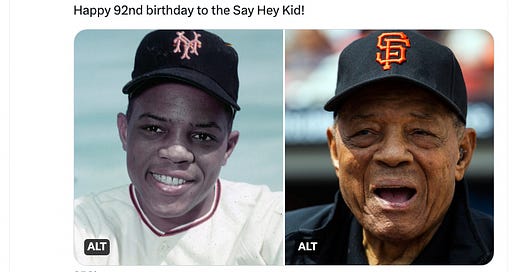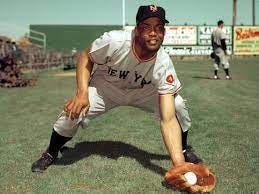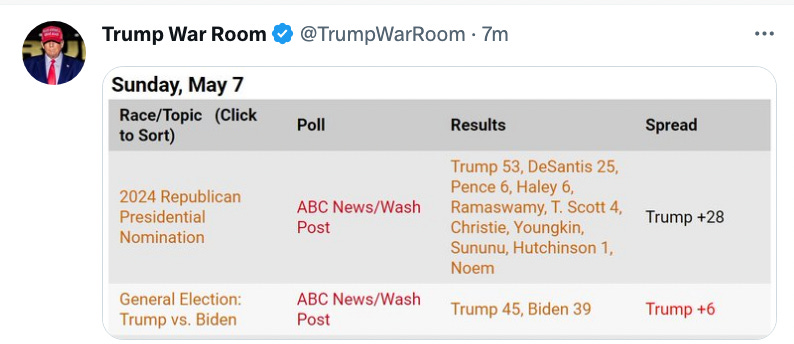Say hey!!
Please become a voluntary paying subscriber to support my work today.
Or pick your own amount and method and make a contribution via:
* Buy me a cocktail (at SFO prices….), tax and server tip included, by clicking here.
* Buy me a cup of coffee (or a week’s worth) by clicking here.
* Check. Send a simple email to markhalperintalk@gmail.com and ask where you can send payment.
• PayPal. markhalperinnyc@gmail.com
• Venmo. Mark-Halperin-4 (telephone number ends in x3226)
• Zelle. markhalperinnyc@gmail.com
Thank you for your support.
Mark
****
I think I have cracked the code on the essence of Ron DeSantis’ challenge in overtaking Donald Trump.
My revelation comes courtesy of former New York Governor Mario Cuomo, who famously said, "You campaign in poetry. You govern in prose."
DeSantis is the writer of instruction manuals for washing machines, while Trump’s persona is pure verse.
Now, Trump is not delivering high-minded, sophisticated sonnets, but rather just an endless stream of bawdy limericks. But the difference between the men is clear, as is the implication.
Put another way, DeSantis campaigns and governs in prose, while Trump does each in poetry.
Seen this way, we can both understand the tough test ahead for the Sunshine State topper and answer the riddle of how he did so well in his reelection campaign.
The explanation for the latter is unlocked by an examination of the tens of millions of dollars of TV ads run by Team DeSantis. Featuring many real people testifying to their love of their governor – and an extremely powerful spot in which Casey DeSantis talked about her husband’s steadfastness support after her cancer diagnosis – those presentations were pure poetry. But pure poetry that didn’t rely on the personality or performance of Ron DeSantis himself.
And in a gubernatorial race, you can spend big money on TV ads to effectively shape the image of a candidate. The views of voters in presidential races are much more informed by earned media, which revolves around daily coverage of the candidates themselves, which means DeSantis has to be the poet on his own.
Watch his Saturday night Wisconsin speech at a big political dinner and see if you hear a lot of poetry:
A candidate’s poems can come through all sorts of modes: gripping storytelling, tales of vivid characters met along the way, humor, personal revelations, playing off the latest news in a “Prairie Home Companion” manner.
That is not what DeSantis does now in his public communications. Being a poet is what Trump is all about. A great number of people who vote in Republican primaries and caucuses are addicted to Trump’s poems.
So, to reframe slightly the choices I posited the other day….
For DeSantis to win the Republican nomination, there are three options:
1. Voters will in fact end up choosing prose over poetry.
2. DeSantis is actually a better poet than he seems, already good enough to win.
3. DeSantis can and will get better at poetry.
If you think the correct answer is (2), read/watch this local news report on the Saturday speech, and check out what the New York Times (one of the few Wisconsin or national organs to even cover the event) wrote:
On Saturday in Wisconsin, Mr. DeSantis engaged in the sort of retail politics that he sometimes avoids, shaking hands, signing autographs and taking selfies. But he left directly after his remarks.
“He was very personable,” said Cindy Werner, a Republican from Milwaukee who ran for lieutenant governor in 2022 and spoke briefly with the governor as he made his way through the crowd. “I don’t understand the media narrative at all.”
More broadly, Ross Douthat’s essential reading column says this:
I will admit, watching DeSantis sag in the primary polls — and watching the Republican and media reaction to that sag — has triggered flashbacks to the 2016 race. Seven years later, it’s clear that many of the underlying dynamics that made Trump the nominee are still in play.
Part of the problem Douthat sees for DeSantis is the challenge he faces in appealing simultaneously to the donor class (who have no use for Trump) and the members of the party base (who have no use for the donor class’ upset over the war against Disney and the restrictive abortion law DeSantis signed).
Bridging that gap requires — you guessed it — poetry.
The new and mind-blowing ABC New/Washington Post poll illustrates another way to think about the Trump edge over his governor:
Trump leads DeSantis by 56 percent to 22 percent among Republicans without college degrees, while college graduates are roughly split between the two at 36 percent for Trump and 33 percent for DeSantis.
Since 2015, Donald Trump, poet, has been talking with passion, emotion, and verse to a powerful movement that seems to want to battle the Blue Army with more than quotidian accomplishments. These folks want the raucous rallies, the tasty tweets and Truths, the reality show symphony.
Trump knows what issues stir the passions and how to talk about them in a fashion so compelling that left, right, and center (including the media) can’t turn away. Poets are unpredictable, creative, and compelling.
Lacking the soul of the poet, DeSantis is left to figure out how to overcome Trump’s lead with the mindset of a workmanlike drafter of prose…and now he faces this, via ABC News:
During his first bid for statewide office in 2018, Ron DeSantis was grappling with a key issue that he could soon face again during his potential 2024 bid for the White House: how to not alienate Donald Trump's base.
"Is there any issue upon which you disagree with President Trump?" DeSantis was asked by Florida Rep. Matt Gaetz in footage exclusively obtained by ABC News of the team's mock debate sessions during DeSantis' 2018 run for governor.
"I have to figure out how to do this," then-Congressman DeSantis replied, while letting out a deep sigh.
"Obviously there is, because I mean I voted contrary to him in the Congress," DeSantis continued. "I have to frame it in a way that's not going to piss off all his voters."
DeSantis goes on to suggest that he would respond by saying he would "do what I think is right," and "support [Trump's] agenda."
"If I have a disagreement, I talk to him in private," he said.
ABC News obtained nearly two and a half hours of raw internal tapes of DeSantis' 2018 debate prep sessions that have not previously been made public. His comments in the videos provide a rare glimpse into how the Florida governor, who is now poised to enter the 2024 Republican primary, had previously calculated how to effectively appeal to Donald Trump's fiercely loyal base while also working to carve out his own lane as a candidate -- a balance that DeSantis may need to hone if he is to secure the party's nomination in 2024.
And here is one more bit from the essential reading ABC story, capturing in a single paragraph the challenge faced by a man of prose, a challenge that no adviser (or team of advisers) can actually help him with:
During one session captured on video, an adviser suggests that DeSantis should immediately write the word "LIKABLE" in all caps on the top of his notepad when he gets to the podium on debate night.
****
Ok, I buried today’s lead.
The lead is actually that new Washington Post/ABC News poll, which is great for Donald Trump and horrible for Joe Biden (and not so great for Ron DeSantis or anyone else running for the GOP nod).
Yes, it is only one poll (albeit a respected one), but it is largely consistent with both other surveys and more qualitative reporting.
Here are just some of the results which should unsettle anyone left in the “Trump can’t beat Biden” camp:
When asked who they would support in 2024, 44 percent of voting-age adults say they would “definitely” or “probably” vote for Trump while 38 percent would definitely or probably vote for Biden. The remaining 18 percent are either undecided or gave another answer….
Among independents, 42 percent say they would definitely or probably back Trump, 34 percent say they are for Biden, and nearly a quarter say they are either undecided, would vote for neither or would not vote at all. Those findings mark a drop-off in support for Biden compared with the 2020 results, when he won independents by nine points…
Biden won suburban voters in 2020 with 54 percent of the vote, according to that same Pew study. In the new Post-ABC poll, Trump slightly leads Biden among suburbanites, with Trump at 45 percent and Biden at 39 percent, a difference that is within the poll’s margin of error. Trump has a huge lead among rural voters while Biden has a small lead among urban voters.
Teams Biden and DeSantis might project a lot of confidence – and they have reasons to be confident – but they can’t look at this poll and claim to have November 2024 wrapped up.
One poll, but one poll that lays waste to Team Biden’s claims about his fitness, his economic record, and his edge over Trump. And one poll that lays waste to Team DeSantis’ “electability” play.
And there is another, related warning sign embedded in a nearly essential reading Wall Street Journal story about the various upcoming challenges faced by Team Biden-Harris:
Following the campaign launch, Mr. Biden’s team declined to release his initial fundraising totals, including the amount raised during the campaign’s first 24 hours—numbers that campaigns often choose to release as a way to show momentum.
People familiar with the early fundraising said the president didn’t surpass the amount raised during the first 24 hours of Mr. Biden’s 2020 campaign, when he brought in $6.3 million from about 97,000 donors, his campaign said at the time.
****
One last point about 2024 and the potency of the Trump candidacy….
This item is ONLY for those attending the Gang of 500 brunch at Lauriol Plaza in a few hours.
It’s not that the rest of you couldn’t understand the point here.
I just don’t have the time or space to explain the whole thing.
Inside this tweet from Chris LaCivita, one of the members of the Trump ’24 high command, is embedded all the reasons why Team DeSantis and Team Biden are not going to have as easy a time as some seem to think stopping the momentum of the indicted poet:
****
THE DEBT CEILING
The Wall Street Journals’ great write up of the state of play has an overall tone that is generally optimistic that a deal will be reached, but said optimism relies on the prospect of a short-term debt limit increase, and/but which they point out faces bipartisan strange bedfellow opposition currently:
“We have to recognize that a short-term increase comes with a cost,” said Sen. Elizabeth Warren (D., Mass.). “It tells the financial markets and the rest of the world that the U.S. government paying its legal debt is somehow open to question and tied up in a tangled political process.”
Texas Republican Ted Cruz said a short-term extension “is a solution that the White House has fever dreams of, but it’s not going to pass Congress.”
I’m still predicting the White House gets an increase through December in exchange for energy permitting reform and then makes a pair of “separate” Christmas Eve (or NYE) deals involving an eighteen-month debt ceiling extension and spending restraint.
My predicted outcome is, on one level, very unlikely, but it is the best I got -- and just as or more sensible/realistic than anything else you can read on Twitter or buy from Ian Bremmer.
****
UKRAINE ESSENTIAL READS
Some U.S. and European officials said they believe that Ukraine’s planned spring offensive could pave the way for negotiations between Kyiv and Moscow by the end of the year, and that China could help bring Russia to the table.
The willingness to encourage negotiations and seek out a role for China in talks represents a shift in Western thinking, particularly in the U.S., which has been highly skeptical of any involvement for Beijing given China’s longstanding support for Moscow. Secretary of State Antony Blinken publicly expressed cautious optimism recently that Beijing could help defuse the conflict.
The approach is based on the belief that neither side has the ability to continue fighting indefinitely, and that Beijing’s willingness to play a role in international peace talks should be tested, the officials said. Still, they remain uncertain about Russia’s willingness to negotiate a cease-fire under Russian President Vladimir Putin.
The Ukrainian military has spent nearly 15 months exceeding the world’s expectations. Now, senior leaders are trying to lower those hopes, fearing that the outcome of an imminent counteroffensive aimed at turning the tide of the war with Russia may not live up to the hype.
“The expectation from our counteroffensive campaign is overestimated in the world,” Ukrainian Defense Minister Oleksii Reznikov said in an interview this past week. “Most people are … waiting for something huge,” he added, which he fears may lead to “emotional disappointment.”
****
I wish I could say America and myself are not now on some level numb to these events, but I struggle to say that.
Hundreds of terrified shoppers fled in panic after a gunman stepped out of a silver sedan and opened fire at a Dallas-area outlet mall, killing eight and wounding seven before being killed by a police officer who happened to be nearby, authorities said.
The shooting in Allen, Texas, on Saturday was the latest eruption of what has been an unprecedented pace of mass killings in the U.S. Barely a week before, authorities say, a man fatally shot five people in Cleveland, Texas, after a neighbor asked him to stop firing his weapon while a baby slept.
Police did not immediately provide details about the victims at Allen Premium Outlets, a sprawling outdoor shopping center, but witnesses reported seeing children among them. Some said they also saw what appeared to be a police officer and a mall security guard unconscious on the ground.
We mourn the dead and pray that our elected leaders can come up with solutions that reflect the best of our nation.














